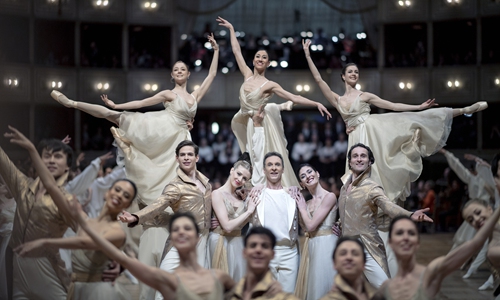Music capital Vienna silenced by coronavirus crisis
Source:AFP Published: 2020/4/15 17:03:40

Dancers of the State Opera Ballet perform in the ballroom during a dress rehearsal for the traditional 64th Vienna Opera Ball at the Vienna State Opera in Vienna, Austria, on February 19. Photo: IC
Austria had hoped that the year 2020 would be dedicated to celebrating the 250th anniversary of the birth of composer Ludwig van Beethoven, who died in Vienna in 1827.But confronted with the coronavirus pandemic, one of the world's music capitals has been silenced, leaving an entire sector fearing for its future.
Although Austria on Tuesday started easing strict confinement measures with shops opening again, resuming cultural life for now is still out of the question.
"The Vienna State Opera usually resembles an anthill where 1,000 people are busy," opera director Dominique Meyer tells AFP.
"Now the place is silent, and it is emotionally very trying."
Normally not a day goes by in Vienna when there isn't an orchestra performance to listen to or an operetta to admire or a festival to attend.
But it all came to an abrupt halt a month ago, with concert halls among the first to shut their doors when the government banned large gatherings to fight the spread of the new coronavirus.
Usually "Vienna offers a cultural program comparable to that of a metropolis of 5 million inhabitants though only 1.8 million live in the city," tourist office director Norbert Kettner says.
"This is what attracts three quarters of the 8 million annual visitors," he adds.
Three operas, two concert halls: Usually some 10,000 people crowd these temples of music each evening. And people have to wait as many as 14 years before hoping to get a subscription to the Vienna Philharmonic Orchestra.
For the city of carefree waltzes composed by musicians like Johann Strauss, the cultural machine's halt spells the worst financial disaster since the end of World War II.
"The Vienna State Opera usually generates 131,000 euros ($143,000) daily in revenue from ticket sales," Meyer says.
"It is a vital economic lung that fills six or seven nearby hotels and a lot of restaurants after performances."
Among those also hit hard are the artists themselves.
"I was to play Arabella in May, go to Toronto, to Istanbul, to Paris," tenor Michael Schade tells AFP.
"I will not sing Schubert; 30 concerts are canceled," baritone Florian Boesch says.
"Performance venues are invoking force majeure. We don't receive any compensation at all."
Contracts are left to expire without any offer of compensation - or sometimes terminated abruptly, says Laurent Delage, an agent for opera singers and conductors.
Postponing productions scheduled years in advance is difficult or even impossible, so set decorations and costumes become useless.
"When a project falls through, an entire microcosm collapses," opera director Benjamin Prins says.
"Technicians, lighting designers, singers: They have given six months of their lives for rehearsals without a penny as generally, they don't get paid until the evening of the premiere."
In the absence of unemployment insurance systems, the Austrian government has put in place some support, allowing artists to obtain at least 1,000 euros ($1,100) per month for 16 weeks.
Beyond this, the highly internationalized sector remains dependent on governments' decisions to re-open their borders, as well as Austria's announcement to re-launch its cultural life.
But the government has already said public events are canceled until at least end of June.
The Alpine nation of 8.8 million people has reported more than 14,000 cases with more than 380 deaths so far, though the surge in new infections has subsided.
"I'm starting to tell myself that there won't be any shows before September," says Kettner of the tourist office, adding that "culture is in the DNA of people - we can't do without it."
Newspaper headline: Uncertain future